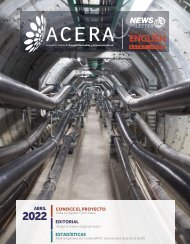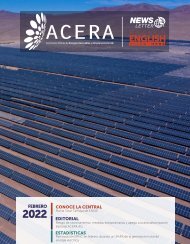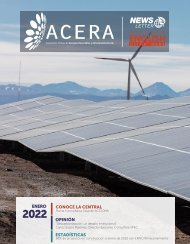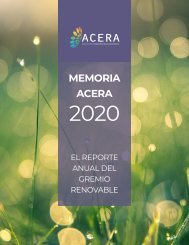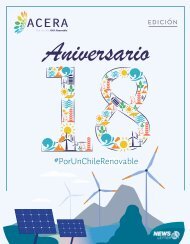Newsletter ACERA - Mayo 2020
You also want an ePaper? Increase the reach of your titles
YUMPU automatically turns print PDFs into web optimized ePapers that Google loves.
04.<br />
EDI<br />
TO<br />
RIAL<br />
REGULATION OF THE ELECTRICITY SECTOR<br />
NEEDS CONSISTENCY<br />
Chile's electricity sector enjoys a well-deserved prestige with domestic and foreign investors, who have<br />
always emphasized its regulatory stability, respect for laws and the powers of public bodies related to this<br />
sector, and also the low intervention of the authorities in matters concerning the market’s functioning.<br />
It has not been easy to achieve this position in a region characterized by permanent political swings that end<br />
up affecting energy policies, particularly those related to the promotion of renewable energy,<br />
decarbonization, fossil fuels, and climate change.<br />
Since the publication of the -then pioneer in the world- General Law on Electric Services in 1982, Chile<br />
began a hard learning curve, had to correct some pre-established concepts, such as the implicit idea that<br />
the generation and transmission segments only required small economic signals to ensure the<br />
investments necessary for the expansion of the system and the offer of competitive prices to their<br />
customers. From this learning came the short laws, the installation of bidding mechanisms to obtain the<br />
supply of energy to distributors, the network code in the form of the Technical Standard of Safety and<br />
Quality of Service, the laws of renewables and the reform of the transmission system, to name just a few.<br />
Today we have an extensive and complex regulatory framework that has shown positive results in terms of<br />
attracting investment, reducing energy prices for customers, achieving a high level of competition, and<br />
rapidly inserting renewable generation sources, thus taking advantage of the vast solar, wind, geothermal,<br />
bioenergy and hydroelectric resources of our country.<br />
This consistency in the regulation of the electricity sector that we have achieved must be<br />
maintained and protected, being the maximum wealth with which Chile counts. The upheaval in our<br />
country resulting from the events initiated in October last year, and then with the health crisis by COVID 19,<br />
has generated a high uncertainty in the industry and we believe that those who have in their hands the<br />
power to regulate the electricity sector should bear in mind the preservation of these aspects, which have<br />
given Chile the recognition of being one of the most attractive markets for investment in clean energy in<br />
recent years.<br />
It is necessary to implement laws, their regulations and their respective rules, unrestricted respect for the<br />
payment chain, as well as compliance with the dates established for the issuance of decrees or resolutions<br />
mandated by the current regulation, all of which are deeply appreciated by the agents of the electricity<br />
market. On the contrary, if any of the aspects mentioned above are not fulfilled, the perception of risk<br />
increases, adding to the uncertainty generated by the social demonstrations and the ongoing pandemic,<br />
reducing the interest of investors and jeopardizing the ambitious goals that Chile has set itself in such<br />
relevant matters as the decarbonization of its electric matrix, the promotion of electromobility, the<br />
decontamination of cities, and the recovery of our "sacrificial zones".<br />
In this regard, our call is to carry out the fundamental discussions in order to continue advancing Chile's<br />
energy transition, which is key –in turn– to the green revival of our economy after the pandemic. We refer,<br />
for example, to the discussion of the law that will modernize the distribution segment, to review (and/or<br />
complete) the regulations and rules that are pending, such as the PMGD regulations, the rule of dispatch of<br />
natural gas plants, the provisions related to flexibility, and the standards necessary to establish the system<br />
of guarantees for the payment chain.<br />
<strong>ACERA</strong> is available to civil authorities, companies and institutions to participate in the discussions that are<br />
required and provide the necessary background to advance this path that has brought such good news to<br />
the country and which we now need more than ever. Representing more than 80% of Chile's renewable<br />
generation and with close ties to various countries in the world, our contribution will enable a healthy,<br />
transparent and deep discussion to achieve a green, sustainable and resilient recovery of our country.<br />
Carlos Finat<br />
Executive Director<br />
José Ignacio Escobar<br />
President





